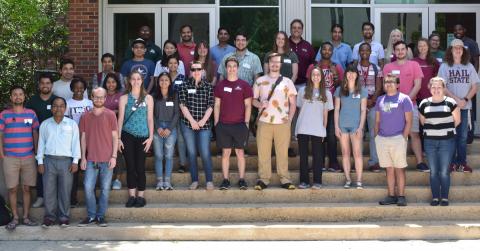Submitted by nfitzkee on

This year's Biochemistry Boot camp is scheduled for June 7-9. Registration is free and is now open! Off campus guests are welcome, and travel grants are available to support your visit to Starkville (see below).
Biochemistry Boot Camp is a three-day event targeted toward undergraduate and early graduate students doing research in biochemistry and biophysics. The sessions are designed to expose students to the computational tools and concepts used routinely in this type of research. The sessions target a broad range of experiences, introducing students to protein and nucleic acid structure and working up to molecular visualization and basic UNIX.
To register, please contact Nick Fitzkee with your name, department and academic year (grad/undergrad).
Continuing in 2021: Travel Grants Available!
 If you are interested in attending from out of town, funding is available to cover your travel, meals, and lodging during the session. You will need to fill out an application form, provide a brief summary (one page) of your summer research plans, and submit a letter from your research adviser. The application form is provided below.
If you are interested in attending from out of town, funding is available to cover your travel, meals, and lodging during the session. You will need to fill out an application form, provide a brief summary (one page) of your summer research plans, and submit a letter from your research adviser. The application form is provided below.
Please email all application materials to Nick Fitzkee before 5:00 PM May 14, 2021. Applicants will be notified of funding before May 31.
COVID-19 Statement: The situation continues to develop with COVID-19, and while we are optimistic that the program will be held this year, we will update applicants should anything change. Current plans for sessions include social distancing and wearing face masks in the classroom, per MSU and CDC guidelines. In addition, single rooms have been requested for all participants. If you have any questions or concerns, please contact Dr. Nick Fitzkee.
Biochemistry Boot Camp is funded in part by the National Science Foundation under grant number 1818090. Any opinions, findings, and conclusions or recommendations expressed in this material are those of the author(s) and do not necessarily reflect the views of the National Science Foundation.
